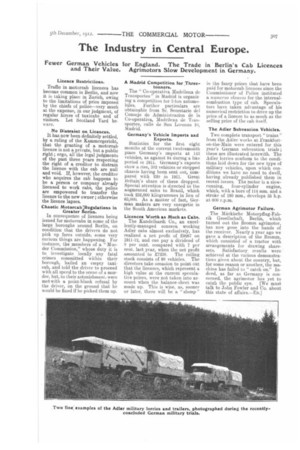The Industry in Central Europe.
Page 21

If you've noticed an error in this article please click here to report it so we can fix it.
Fewer German Vehicles for England. The Trade in Berlin's Cab Licences and Their Value. Agrimotors Slow Development in Germany.
Licence Restrictions.
Traffic in motoreab licences has become common in Berlin, and now it is taking place in Zurich, owing to the limitations of price imposed by the chiefs of police—very much at the expense, in our judgment, of regular hirers of taxicabs and of visitors. Let Scotland Yard beware.
No Distraint on Licences.
It has now been definitely settled, by a ruling of the Kamraergericht, that the granting of a motoreab licence is not a private, but a public right ; ergo, all the legal judgments of the past three years respecting the right of a, creditor to clistrain the licence with the cab are null and void. If, however, the creditor who acquires the cab happens to be a person or company already licensed to work cabs, the police are empowered to transfer the licence to the new owner ; otherwise the licence lapses.
Chaotic Motorcab:Regulations in Greater Berlin.
In consequence of licences being issued for motorcabs in some of the large boroughs around Berlin, on condition that the drivers do not pick up fares outside, some very curious things are happening. For instance, the members of a "Murder Commission," whose duty it is to investigate locally any fatal crimes committed within their borough, hailed an empty taxi, cab, and told the driver to proceed with all speed to the scene of a murder, but, to their astonishment, were met with a point-blank refusal by the driver, on the ground that he would be fined if he picked them up. A Madrid Competition for Threetonners.
The " Co-operativa Madrilena de Transportes " in Madrid is organiz ing a competition tor 3-ton automobiles. 1:urther particulars are obtainable from Sr. Secretarie del Consejo de Administracion de la Co-operativa, lladrilena do Tiansportes, calle de San Lorenzo 10, Madrid.
Germany's Vehicle Imports and Exports.
Statistics for the first eight months of the current twelvemonth place Germany's imports at 143 vehicles, as against 94 during a like period in 1911. Germany's exports show a rise, 382 vehicles or stripped chassis having been sent out, compared with 220• in 1911. Great Britain's share of these dropped. Special attention is directed to the augmented sales to Brazil, which took 232,000 kilogrammes in lieu of 63,000. As a matter of fact, German makers are very energetic in the South American markets.
Licences Worth as Much as Cabs.
The Kandelhardt Co., an excellently-managed concern working Adler cabs almost exclusively, has realized a net profit of £9267 on 1911-12, and can pay a dividend of 8 per cent. compared with 7 per cent, last year, when the net profit amounted to 27238. The rolling stock consists of 98 vehicles. The directors take occasion to point out that the licences, which represent a high value at the current speculative prices, were not taken into account when the balance-sheet was made up. This is wise, as, sooner or later, there will be a " slump "
in the fancy prices that have been paid for motorcab licences since the Commissioner of Police instituted
numerus clans as for the internalcombustion type of cab. Speculators have taken advantage of his numerical restriction to drive up the price of a licence to as much as the selling price of the cab itself.
The Adler Subvention Vehicles.
Two complete transport " trains " from the Adler works at Frankforton-the-Main were entered for this year's German subvention trials ; these are illustrated herewith. The Adler lorries conform to the conditions laid down for the new type of military vehicles, upon which conditions we have no need to dwell, having already published them in recent issues. The motor is a slowrunning, four-cylinder engine, which, with a bore of 114 rum. and a stroke of 160 mm., develops 35 h.p. at 600 r.p.m.
German Agrimotor Failure.
The Markische Motorpfiug-Fabrik Gesellschaft, Berlin, which turned out the Bromm agrimotor, has now gone into the hands of the receiver. Nearly a year ago we gave a description of the Bromm, which consisted of a tractor with arrangements for drawing share sets. Satisfactory results were • achieved at the various demonstrations given about the country, but, for some reason or another, the machine has failed to " catch on." In deed, as far as Germany is concerned, the agrimotor has yet to catch the public eye. [We must talk to John Fowler and Co. about this state of affairs.—En.]


























